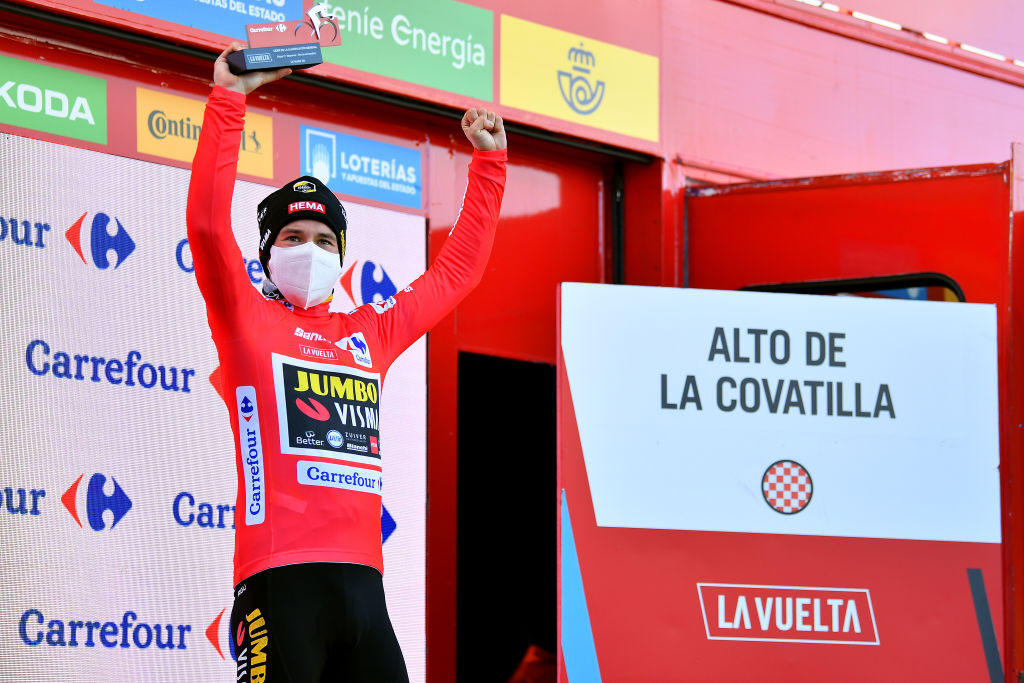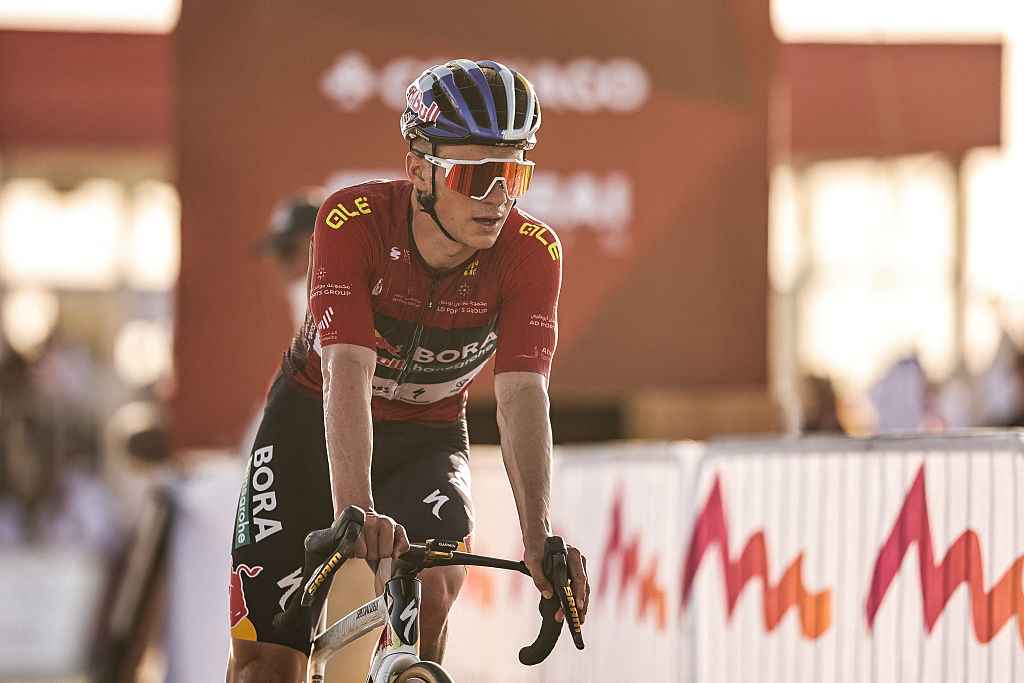Primoz Roglic holds on to Vuelta a España overall lead despite late scare
All-out attack by Carapaz in closing kilometres fails to dislodge leader

The latest race content, interviews, features, reviews and expert buying guides, direct to your inbox!
You are now subscribed
Your newsletter sign-up was successful
He’s done it. Primož Roglič (Jumbo-Visma) will secure his second Vuelta a España in a row after Sunday's stage 17 despite a nail-biting finale on the Covatilla summit finish that saw a devastating late attack by arch-rival Richard Carapaz (Ineos-Grenadiers).
Roglič looked to be in serious trouble when Carapaz stormed away some two and a half kilometres to go on the windswept Covatilla - and with a margin of just 45 seconds overall it was clear the Slovenian would have to dig very deep to save la roja.
Finally, with some very timely assistance from team-mate Lennard Hofstede - Jumbo-Visma had made the soundest of strategic decisions to get at least one rider in the break of the day and Hofstede was there for Roglič exactly when it mattered the most - then following Movistar’s Marc Soler and Enric Mas, and finally striking out alone again, Roglič was able to limit his losses to Carapaz to 21 seconds. And the Vuelta was his.
When Roglič looked to be struggling, more than one TV commentator had evoked Roglič’s disastrous final time trial in the Tour that cost him the maillot jaune. But finally, at the end of a roller-coaster season, the Slovenian will end his year with a second Grand Tour in his palmares.
And if he had cracked and lost his lead? Four stage wins and three second places, not to mention the points jersey, would have been a considerable haul for any rider, but as it was the time bonuses - totaling 48 seconds - garnered as a result of those stage placings which proved invaluable int he GC battle as well. However, Roglič denied that going for stages formed part of a pre-race strategy to net him the overall.
“When you win, you don’t look at how you do that, so I’m just super happy that I made it. We all have the same chance for those bonus seconds and if I can take them, I will,” he told reporters.
“It was the same today. The guys went full gas and I went full gas. I was the best, our team was the best and I’m just super happy and proud of what I’ve done.”
The latest race content, interviews, features, reviews and expert buying guides, direct to your inbox!
As for the last, critical, three kilometres as Carapaz disappeared up the road ahead of him, Roglič said he did not panic. “I never doubted that I would win the Vuelta, even if it’s never finished until you cross the finish line.”
He also recognised that being able to follow Mas and Soler in the finale was “definitely” of assistance. “Every guy you have around [with you] is super-welcome and for all of us it was a big, big fight to the finish. But Lennard, especially, was also super-welcome.”
Taking one Vuelta is never simple, but taking two is a rare event indeed. When he dons his final red jersey late on Sunday afternoon in Madrid, Roglič will become the first rider to take two consecutive Vueltas since Roberto Heras, coincidentally from the town of Bejar at the foot of the Covatilla, took three in a row between 2003 and 2005. And for the second year running, Roglič is the only rider to secure podium finishes in two Grand Tours and the first to take a Grand Tour and Monument in the same year since Laurent Jalabert won the Vuelta and Milano-San Remo in 1995.
Roglič’s second Vuelta is also, regrettably, special because it has, been a race with - and against - the pandemic. Although no riders have tested positive in the Vuelta to date, and it looks likely (but not certain) that will continue to be the case all the way to Madrid, COVID-19 has always been a troubling, constant presence, right down to the restrictions and confinements across Spain, and, of course, the lack of public on the big climbs. But finally, the Vuelta has made it through.
“It was the same for me as for all of us, every day it was a fight with full gas racing,” Roglič said. “But anyway, getting this race to the finish is an achievement for each and every one of us. Everything went well. Everything worked. A big thanks to the organisation and everybody involved who made this possible. We can see in the world it’s a really bad situation but we still could do some racing and maybe produce some positive news at the end of the day.”
For Roglič the Vuelta was his chance too, to regain momentum in the Grand Tours after that shock defeat on the Planche des Belles Filles. Taking Liège-Bastogne-Liège was one major part of the process of bouncing back, but doing that in a three-week stage race arguably requires a greater level of personal resolve.
“Like I said, I’m always a guy that wants to race. I just move on, huh? I had to accept it, I was second which is a beautiful achievement, and I had quite a few obstacles to come to the Tour. But we did a beautiful Tour with the whole team, I couldn’t have dreamed of riding so well for three weeks.”
“Coming here was quite different. I’d won a Monument at Liège, and then I was here trying to win a three-week Vuelta. I started every day as if this was a Classic, each stage by itself, and today - or actually tomorrow - we get to the finish: beautiful.”
“I’m super-proud of this season, all the things we did, because in four months I’ve been home in ten days. So that’s quite a big block, and I’m grateful for all the support I’ve had.”
As for next year? Roglič recognised that he not yet thought about if he would be looking to capture the Tour de France that he lost at the last possible moment. “I don’t know, it’s just good to be able to finish this season this way,” he argued. “For sure I will take a good break and then think about next year.” The Tour is only one possible goal, he seemed to suggest, when he added, "There are still a lot of things that I haven’t achieved and I’m motivated to do them.”
The flip side of that particular coin, of course, is whether Roglič would have come to the question as motivated to win the Vuelta if he had triumphed in the Tour, and how winning the Vuelta this year felt in comparison to 2019.
“I think so, everywhere I want to win, I’m a racer, “ he said in answer to the first question. “Last year was special, it’s always different when you win something for the first time, but achieving this for a second time was a beautiful success. It also rounds off a beautiful season for me.”
Alasdair Fotheringham has been reporting on cycling since 1991. He has covered every Tour de France since 1992 bar one, as well as numerous other bike races of all shapes and sizes, ranging from the Olympic Games in 2008 to the now sadly defunct Subida a Urkiola hill climb in Spain. As well as working for Cyclingnews, he has also written for The Independent, The Guardian, ProCycling, The Express and Reuters.

